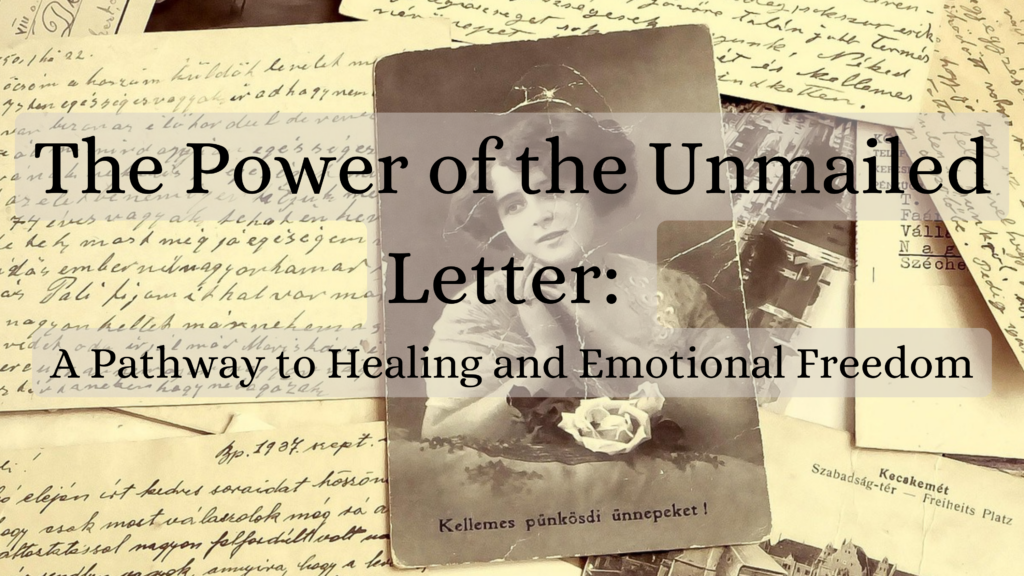The Power of the Unmailed Letter: A Pathway to Healing and Emotional Freedom
Have you ever replayed a painful conversation in your head, wishing you had said something differently? Or maybe you’re carrying unspoken words—resentment, grief, gratitude, or even love—that feel too heavy to hold but too risky to express.
This is where the unmailed letter becomes a powerful tool and it’s a therapeutic exercise that allows you to say everything you need to say without fear of judgment, consequence, or misunderstanding. By writing a letter that will never be sent, you create a safe space for emotional release, clarity, and healing.
Let’s explore what an unmailed letter is, why it’s so beneficial, and how it can be a transformative practice in your healing journey.
What Is an Unmailed Letter?
An unmailed letter is exactly what it sounds like—a letter you write with the full intention of never sending it. It can be addressed to a:
- Person who hurt you in the past
- Loved one you’ve lost
- Person you need closure with
- Version of yourself (past, present, or future)
- Situation or event that deeply impacted you
- Abstract concept like Fear, Love, or Time
The letter’s purpose is not to get a response or change the other person. Instead, it’s about releasing bottled-up emotions and reclaiming your peace of mind.
Why Writing an Unmailed Letter is So Powerful
It Releases Emotional Baggage
Unspoken emotions have a way of festering inside us, manifesting as stress, anxiety, or even physical symptoms like tension headaches and fatigue so writing an unmailed letter allows you to empty the emotional container, preventing it from overflowing into your daily life.
It Provides a Safe Outlet for Expression
There are some things we feel but cannot—or should not—express directly to someone. Maybe they have passed away, maybe they are unwilling to hear us, or maybe expressing them would cause more harm than good but an unmailed letter offers a private, judgment-free space to say exactly what you need to say without the fear of repercussions.
It Helps You Gain Clarity and Perspective
Writing forces you to organise your thoughts, which helps bring subconscious emotions to the surface. As you write, you might uncover patterns, gain new insights, or even realise that your feelings have changed and this clarity often leads to emotional resolution, even without a real-world conversation.
It Reduces the Power of Negative Emotions
Holding onto anger, resentment, or grief can be like carrying a burning coal—it only hurts you. Writing these emotions out helps discharge their intensity, making them easier to process and release.
It Fosters Self-Compassion and Forgiveness
Sometimes, the person we need to write to is ourselves. Writing a letter to your past self—offering understanding, encouragement, or forgiveness—can be incredibly healing as it allows you to rewrite your self-narrative with more kindness and grace.
How Writing an Unmailed Letter is Therapeutic
The Brain Interprets Writing as a Real Experience
Studies in neuroscience show that writing engages the brain’s logical and emotional centres. When you write something down, your brain processes it as if you are actually speaking the words and this is why writing an unmailed letter feels so relieving—your brain interprets it as a real emotional release.
It Helps Complete the ‘Unfinished Business’ Cycle
Many of us carry unresolved emotional loops—unfinished business that keeps replaying in our minds. Writing an unmailed letter provides a way to “close the loop” and gain closure, even if the situation remains unchanged.
It Promotes Emotional Regulation
Writing down your feelings activates the prefrontal cortex, the part of the brain responsible for emotional regulation and decision-making and this helps you process emotions more effectively and prevents reactive emotional responses in real life.
It Supports Healing from Trauma and Grief
For those recovering from abuse, loss, or deep betrayal, an unmailed letter can be a stepping stone toward healing as it allows you to reclaim your voice, validate your emotions, and start the process of emotional detachment from painful memories.
How to Write an Unmailed Letter: A Step-by-Step Guide
Choose Your Recipient
Decide who (or what) the letter is for. It could be a specific person, a past event, or even an aspect of yourself.
Write Freely and Honestly
There are no rules here, so let your emotions flow. Say everything you’ve held back; this is your space to be raw, unfiltered, and real.
Express All Your Emotions
You don’t have to be polite or censor yourself. If you’re angry, let it out, and if you’re heartbroken, say why. If you need to forgive, allow that space to emerge naturally.
Decide What to Do With It
- Keep it in a journal for future reflection.
- Rip it up and discard it as a symbolic release.
- Burn it (safely!) to signify transformation.
- Bury it as a way to ‘lay the past to rest.’
Choose whatever method feels most cathartic for you.
A Simple Writing Prompt to Get Started
If you’re unsure where to start, try this prompt:
“Dear [Name],
I have carried these words inside me for too long. Today, I set them free…”
Let your heart take over from there.
Final Thoughts: The Letter You Never Send But Always Needed
The unmailed letter is not about changing the past—it’s about changing your relationship to it. It’s about giving yourself permission to feel, express, and, ultimately, heal.
You create space for peace, clarity, and emotional freedom by releasing what no longer serves you and sometimes, the most powerful words are the ones only you ever read.
So, what do you need to say today? 💜
💞Looking for support in building relationship skills or developing your own current relationship, join my free FACEBOOK community ‘Relationship Academy‘ ?
📚If you are wondering what to read next, you could try 7 Mindset Shifts to Awaken Your Infinite Potential

